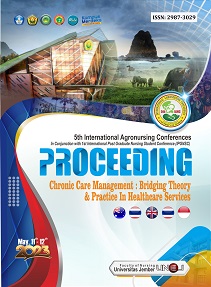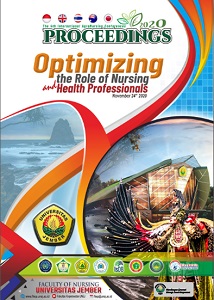THE INFLUENCE OF PHARMACEUTICAL CARE SERVICES MODEL IN PRESCRIPTION DRUGS ON PHARMACIST’S BEHAVIOR IN PHARMACEUTICAL CARE
Abstract
Pharmaceutical care is an important element inproviding health services that must be integrated
with other elements where pharmacist has
responsibility in the quality of such cares (Gennaro,
2000). Pharmaceutical care is generally based on
pharmacist’s responsibilities to guarantee
conformity, effectiveness, and safety of drug therapy
by identifying, preventing, as well as solving
problems of drug therapy received by patient.
Pharmaceutical care as a practical guidance is
described into three activities: 1) assessing patient’s
needs regarding drug therapy, 2) making care plans,
3) following up care plans and evaluating. An
approach is needed to assess patient’s needs
regarding the used drugs which can cover precision
of indication, capable to achieve therapy effects,
security and conformity of drug usage.
Therapeutic communication between pharmacist
and patient becomes the absolute requirement in
performing pharmaceutical care. The finding of
research conducted by Research Center of Ministry
of Health that was taken in five provinces in
Indonesia stated that pharmacist as the person in
charge in the lack of communication happened in
the drugstore between pharmacist and consumers in
particular and society in general (Zalbawi, 1991).
In the research conducted by Indri Mulyani
Bunyamin (2005), it was found that 69.9%
pharmacists works in the drugstores around DKI
Jakarta have high quality practices particularly in the
practical management and accountability, but still
have low pharmaceutical care.
The finding of the research on the implementation
of pharmaceutical care in prescribed drug service
found that pharmacists’ activity in assessing
prescription completeness, 3.8% bad of doctors’
prescription, dentists’ prescription, and veterinaries’
prescription; 2.9% bad of drug preparation and
dispensing; 21.5% bad of assessment of patient’s
drug therapy; 33.3% bad of making plans for
patient’s drug therapy; 41.9% bad of evaluation and
following up patient’s drug therapy (Athiyah, 2005).
The finding indicates that pharmacists are still
oriented on drug supply as product, while patient’s needs-oriented which is usually described as the
effort to improve life quality is still ignored.
Based on the description and the fact above, there
are lot of issues that must be explored further about
how pharmaceutical care as a philosophy is
implemented in the form of pharmacists’ task
behavior in drugstore. Thus, this study examined
pharmacists’ behavior in pharmaceutical care. The
general objective of this study is to create
pharmaceutical care model of prescribed drug
service and its influences on the pharmacists’
behavior in pharmaceutical care.
Published
2017-01-27
How to Cite
ATHIYAH, Umi.
THE INFLUENCE OF PHARMACEUTICAL CARE SERVICES MODEL IN PRESCRIPTION DRUGS ON PHARMACIST’S BEHAVIOR IN PHARMACEUTICAL CARE.
UNEJ e-Proceeding, [S.l.], p. 70-74, jan. 2017.
Available at: <https://jurnal.unej.ac.id/index.php/prosiding/article/view/3894>. Date accessed: 22 dec. 2024.
Section
General









